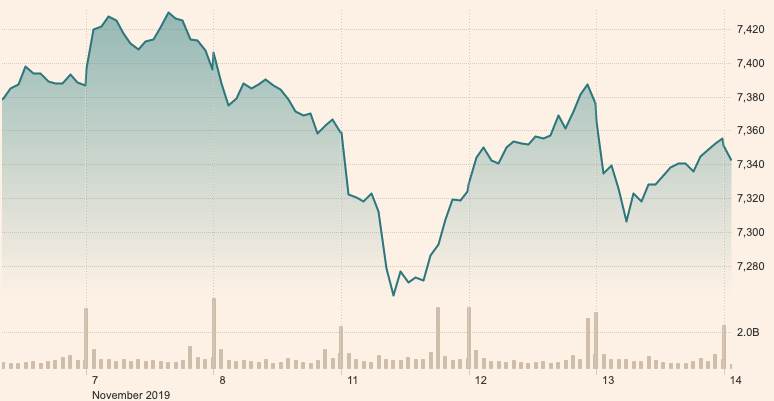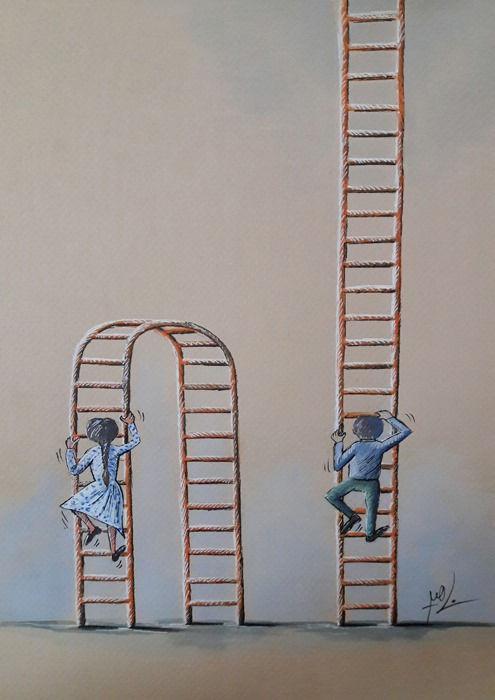- Charlotte Street Partners

- Nov 14, 2019
- 6 min read
14th November 2019
Written by Sabina Kadić-Mackenzie, Associate Partner
Edited by Kevin Pringle, Partner
Good morning,
I don’t remember the last day before I became a refugee. I have other memories of that time, but not that day specifically. Maybe I played with my friends. Did I do homework? Perhaps I tiptoed into our kitchen as I did every other day to sneak an extra piece of something deliciously Balkan my mother had cooked.
This isn’t a sob story. It’s a wake-up call. None of us ever expects to be a refugee, an asylum seeker or any other headline statistic. Even when soldiers are assembling in your garden, you simply don’t see yourself that way. That is something that happens to other people. In other places. Not to me. Not here.
When it does happen though, what some, perhaps naively, expect is that when faced with the most horrendous and trying moments of our lives, a mutual human connection and sense of decency will prevail.
v
Today as up to 300 asylum seekers wait to be evicted from their homes in Glasgow, this assumption is sadly proven wrong.
Yesterday, judges at Scotland’s highest court found that Serco's evictions of asylum seekers were lawful, refusing to overturn an earlier judgment, in effect giving authorities the right to evict people onto the streets as temperatures plunge.
However, perhaps the most controversial element of this divisive case is this: in its judgment, the court found that Serco could proceed with the planned evictions because it was not acting as a public authority – despite being recruited by one to conduct its work on their behalf. In effect, this means that Serco is not bound by the Human Rights Act to protect the vulnerable.
The consequences are profound. In a landscape of increasing dependency on private providers by public bodies, how can people’s rights be protected in these circumstances?
Are we willing to accept that governments can divest themselves from their human rights obligations on a technicality? And if we do, where does it end?
Serco says that it will now proceed with around 300 evictions “in a considered and sensitive manner”.
Meanwhile, people who find themselves seeking asylum and its protections – who thought of themselves, not as a nuisance or drain on society, but of themselves as simply human beings – are to be turned out onto the streets of Glasgow with no access to recourse or public funds.
The court case is over. The eviction notices sent. Locks are about to be changed. And so is, hopefully, the accountability of companies who are commissioned to provide public services.
Yesterday, those affected by this decision were getting on with rebuilding their lives. Today they’ll question why they didn’t see it coming.
Today they’ll question why human decency failed on a technicality.
News
Impeachment hearings against US president Donald Trump yesterday suggested that the president was directly involved in efforts to force Ukraine to investigate his political rival, Joe Biden. During his opening statement in what was the first public impeachment hearing, Bill Taylor, the US chargé d’affaires at the Ukraine embassy at the time of the call, said that the president made a widespread effort to reshape US-Ukraine policy to his benefit, using a backchannel of loyal aides to apply the pressure. Trump, who was hosting the President of Turkey at the White House, claimed that he did not watch the testimonies.
During their meeting yesterday, Donald Trump lauded his relationship with Recep Tayyip Erdoğan and vowed to ease tensions between the US and Turkey. Trump's warm welcome of the Turkish president came amid anger in the US Congress about Ankara's offensive into Syria to drive out Kurdish forces, one of Washington's main partners in the fight against Daesh.
A survey by the Fawcett Society found that 60% of British working women either did not know what their male counterparts earned or believed that they were paid less than their colleagues, despite doing the same job. The survey, which was designed to coincide with Equal Pay Day, also found that only four out of every ten working women can say confidently that they are paid the same as their male colleagues for doing the same or a similar job.
Business and economy
WT.Social, a new social network free of ads created by Jimmy Wales, Wikipedia’s co-founder, was launched in a bid to combat fake news and clickbait. Despite being completely independent, WT.social shares the same business model as Wikipedia: it will rely on donations from a small subset of users to allow the network to operate without the advertising that he blames for encouraging the wrong kind of engagement on platforms such as Twitter and Facebook.
Europe’s largest CO2 polluter, RWE, published good results yesterday for its third quarter, mainly due to its British subsidiary, which produces over 10% of Britain’s electricity. Thanks to the results, the company also raised its outlook for the second time in three months. Despite its large carbon footprint, RWE is seeking to become one of Europe’s largest renewables companies and be carbon neutral by 2040.
After an IPO attempt that left the company on the brink of bankruptcy, WeWork is in the midst of an expansion effort to turn the business around. The company announced on Wednesday that it has added a record number of desks to its global network in the last few weeks, and WeWork India announced efforts to raise $200m by the end of the year to fund further expansion in that country. Net losses, however, more than doubled in the third quarter $1.25 billion as a result.
Markets
What happened yesterday?
Global equities underperformed yesterday as investors worldwide were left unimpressed by the lack of progress in the easing of US-China trade tensions. Escalating unrest also added to the bearish mood.
In the US, stocks also opened lower over notes from Federal Reserve chairman Jerome Powell's testimony to the Joint Economic Committee of Congress later in the session. The Dow Jones Industrial Average was down 0.06% at 27,675.28, while the S&P 500 opened 0.10% weaker at 3,088.83 and the Nasdaq Composite started out the session 0.12% lower at 8,476.13.
Meanwhile, European stocks also closed lower: the Stoxx 600 was 0.26% lower at 405.86, Germany's Dax dropped by 0.4% to 13,230.07 and the French CAC 40 fell by 0.21% to 5,907.09.
British equities were also down. London's FTSE 100 decreased 0.19% at 7,351.21.
What's happening today?
Finals
Tracsis
Interims
First Group Mediclinic International National Grid NextEnergy Solar Stobart Group Urban Lo
Q3 results
Helios Towers Telecom Egypt
AGMs
Aeorema Comm Byotrol Eagle Eye
Genus Infra.india Jupiter European Opportunities Trust New Star Inv Picton Prop Ricardo Dfs Furn
UK economic announcements
(00:01) RICS Housing Market Survey (09:30) Retail Sales
Intl. economic announcements
(10:00) GDP (Preliminary) (EU) (13:30) Initial Jobless Claims (US) (13:30) Producer Price Index (US) (13:30) Continuing Claims (US) (16:00) Crude Oil Inventories (US)

Columns of note
Writing for The Times, Simon Nixon argues that political instability and the rise of populism are ushering in the need for the eurozone members to finally agree on completing their banking union, and more importantly creating a system of common deposit insurance. Economists have long argued that the lack of such a scheme remains a key vulnerability for the single currency. Without one, there’s a risk that a new banking crisis in a member state becomes a new sovereign debt crisis in the whole eurozone, Nixon says. Germany, which has long been the main opponent to a deal, has put forward some proposals on how to break the impasse. This is an opportunity that Europeans should not let pass, Nixon concludes.
The FT editorial board argues that Evo Morales is leaving behind a negative legacy in Bolivia. Despite solid progress in reducing poverty and enfranchising the country’s indigenous majority, his style became sectarian and his government authoritarian. Opponents were labelled as racists and some driven into exile, indigenous activists tired of his intolerance, and reliance on a growth model based on natural resource exploitation began to run out of steam. Rather than recognising those errors, Morales has instead chosen to cast himself as an innocent victim and incite his supporters to fight on. This has further divided an already polarised country at a critical time and fuelled widespread violence by supporters and opponents of the former government.

Did you know?
Harry Potter has been translated into Ancient Greek so that students of the dead language would have something fun to decipher.
Parliamentary highlights
TODAY
House of Commons
The House of Commons is in dissolution. The House will next sit on Monday 16 December 2019.
House of Lords
The House of Commons is in dissolution. The House will next sit on Monday 16 December 2019.
Scottish Parliament
General Questions
First Minister’s Questions
Members’ Business debate
Day of the Imprisoned Writer – Ruth Maguire
Portfolio Questions
Government Business and Constitutional Relations
Scottish Government debate
Implications of the Imposition of US Tariffs on Scottish Products
TOMORROW
Scottish Parliament
No business scheduled.

Comments